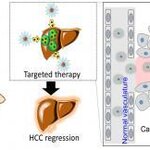
Hepatocellular carcinoma (HCC) is the second leading cause of cancer-associated death worldwide, due to the difficulty in treating this cancer using conventional chemotherapeutic drugs such as doxorubicin, epirubicin, cisplatin, 5-fluorouracil or etoposide.
A group in Asia believes this may be because medicines are not able to reach liver tumor cells in sufficient levels without harming to the rest of the body. They believe alternative drug treatment options that are able to target the tumor tissues, without inducing toxicity in other parts of the body, may be the solution, so Professor…



